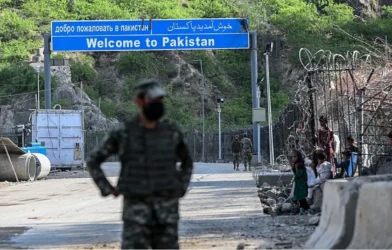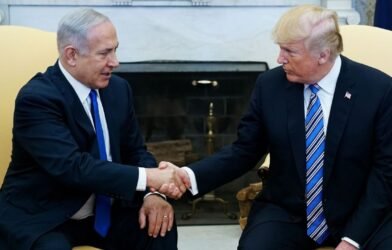Subtotal $0.00
It seems that the decision of the ruling party in India to announce the full annexation of Kashmir to India by repealing Article 370 in the constitution came as a surprise to many observers, although the Indian People's Party (BJP) was not hiding its intention in this regard, as it included a clause on the subject in its election program for the second consecutive term, with a difference that many did not (apparently) pay attention to, until it was realized, as in its election program for the current term, the phrase in consultation with stakeholders was removed from the text of repealing the decision, unlike for the first time.
The announcement was carefully planned (apparently), as it was preceded by a period in which the term of the state legislature expired, the local government was dissolved, and it was announced that elections in the region could not be held due to the inability to provide the appropriate security conditions for holding them, as a result of the terrorist acts that the region witnessed at that time, which (at the same time) did not disrupt voting in the general elections. Thus, there was no local government for the region and no legislative council, when the ruling party pushed the draft resolution to the House of Representatives and issued a presidential executive order to repeal Article 370, on which the treaty of accession of the region to India in 1947 was based, without consulting the region, while dividing the region into two centralized regions governed by the center in Delhi directly.
The Indian announcement was accompanied by the arrest of the most important political figures in the region, such as former senior ministers, public figures and community leaders who opposed the idea of separating from India, such as Mehbooba Mufti and Omar Abdullah, cutting transportation and communication networks, declaring a curfew, asking foreigners to leave the region, and announcing the suspension of the Hindu pilgrimage season.
Historical background
It is historically proven that Kashmir, which is home to some of the most important Hindu holy sites, saw its population convert to Islam relatively late. After the British seized Kashmir, it was sold to the rulers of Jammu region from the Hindu Gurkha tribe, although the majority of the population was Muslim. In 1924, the region was granted special privileges to ensure the distinctiveness of the region's personality, and this remained the case until 1947, when Pakistan (as a special region for Muslims) was declared separate from India, and four emirates remained to be determined, including Kashmir. However, the governor of the region, Hari Singh, had a different opinion, as he preferred not to join either of the two countries and maintain the independence of the region. Pakistani irregular forces from the Pashtun tribes attacked the region, forcing Hari Singh to seek protection from the Indian government in New Delhi, which conditioned him to sign an accession agreement with India, which he signed without the authorization of the people of Kashmir. He signed it without a popular mandate, stipulating that the region would maintain relative autonomy, have its own constitution, parliament, government, and laws, and delegate defense, foreign affairs, and communications to the central government, a temporary status until the conflict in the region was resolved, as stipulated in the Indian Constitution under Article 370. This account is closer to that of the people of the region.
Opponents of this narrative argue that Article 370 was temporary as a transitional state before full integration into India, and that what the region received as a result was a special status granted to it to facilitate its accession to India, not a permanent contractual status between two entities, each of which has a sovereign status, and therefore the origin is to end this status that has lasted for decades without an acceptable justification.
The ruling party justified its actions in parliament, in the words of Home Minister Amit Shah, as correcting a historical error. In his view, the aforementioned article is the main pretext for terrorism. It violates human rights, especially the rights of Kashmiri women, who are prevented from owning property if they marry someone from outside the region, and harms the rights of all those who have lived in the region for many decades without having the right to work or own property there. Giving Kashmiris the right to legislate for themselves makes their laws outdated and incompatible with what is practiced in other states in India.
Supporters' reactions
The ruling party derives its legitimacy from the broad popular support it received in the last election, something no other party has had in nearly three decades, enabling it to govern comfortably. The majority of its voters see Kashmir as an issue that is ripe for resolution, regardless of the method. He also has two important supporters: the world's largest voluntary association, the National Volunteer Society (NVS), a right-wing Hindu organization to which the majority of the party's senior figures and leaders belong, and the business class, both of which see the decision as favorable because it is in line with the principles of the RSS, which calls for the unification of India's territory under the Hindu majority within the Hindutva doctrine of Hindutva. As for the large businessmen, they see great investment opportunities in the region. Article 370 prevented them from expanding investment in the region as a result of the restriction of ownership to the people of the region, and with the removal of this article, the door will open wide for them in this regard.
Some non-Muslims residing in the region also see the repeal of the article as an opportunity to reunite them with the Hindu majority and end the monopoly of the majority Muslim population on privileges, such as government jobs in the region, especially those who came and resided in the region after 1947, and who are treated (despite all these years) as strangers.
Opponents' reactions
Kashmiris
The most prominent opponents of this decision are the people of the region, the Kashmiris, who are divided into two sections; the first section considers the Indian presence in the region as a foreign occupation and believes in resisting it by all civil and military means, and another section believes in a political solution under the umbrella of the Indian state with the region retaining its personality, and they have always viewed their relationship with the center as a contract between two parties and not a relationship of full integration. They have participated in political life through local and central elections and held various positions, although they have sometimes criticized the behavior of central governments towards the region, which worked to erode the privileges granted to the region in Article 370 of the constitution.
Kashmiris fear this decision the most because the center is seeking to change the identity of the region, some of which has been expressed by many politicians of the ruling party at the center, by calling on cadres and youth of the Indian People's Party to marry the "beautiful" girls of the region (as they put it), and seeking to change the demographic composition, by allowing large companies and state institutions to own land in the region and establish major projects on it that will bring millions of Hindu Indians to the region, so that the Muslims of the region become a minority in their homeland. This is in line with the Hindutva doctrine espoused by the leaders of the ruling party, which seeks to undermine the Islamic presence in India, which is aimed at fragmenting the region and turning it into regions administered from the center.
It has become clear that the ruling party in Delhi has dealt a very painful blow to those who believe in a political solution, such as former chief ministers Farooq Abdullah Mehbooba Mufti and Omar Abdullah, by taking the decision to repeal the said article, without referring to the contracting party, the people of the region represented in the local parliament (currently expired) or its politicians, or even resorting to a popular referendum. The decision to de-personalize the region by dividing it into two parts and downgrading it to centralized regions directly administered by New Delhi was understood by them as a direct diktat taking advantage of the power disparity between the two parties, considering the government's policy as unconstitutional and a betrayal of the people of Kashmir.
The central government's move has contributed to unifying the positions of the opposing parties, as there is a popular consensus in Kashmir to reject it, which is extremely dangerous and unprecedented in India's history, and it is unlikely that the central government is unaware of it, although it seems to be counting on imposing a fait accompli by virtue of its possession of many cards of power, including the presence of about half a million Indian soldiers in the region. However, it is nevertheless embarking on a dangerous adventure that could lead to the unification of the conflicting Kashmiri forces to reject the Indian presence, declare it a state of occupation, and resist it by all means based on a state of national consensus, which means that things could turn into a state of civil disobedience and a comprehensive violent confrontation with India, not limited operations that can be controlled as before, which is possible, especially with Pakistani support, and could turn into a state of attrition for the Indian armed forces and the Indian economy (if it happens), thus weakening the ruling party in Delhi's popularity and possibly losing Kashmir forever.
Indian Muslims
Indian Muslims suffer from exclusion and marginalization, according to the report of the government's Sachar Committee in 2005, as their representation in the current parliament (for example) is less than 5 percent, which is one-third of their percentage of the population. The majority of Indian Muslims today view this decision with great concern and fear for their future, as many of them see it as part of a declared plan adopted by the Indian People's Party (the political arm of the RSS) to liquidate the Islamic identity and presence in India. These efforts will not be limited to Kashmir, but will extend to all Indian Muslims, who, according to official statistics, account for about 15 percent of the population (and according to estimates by some of their leaders, about 20 percent of the population), through steps, the most important of which is the realization of citizenship, which the government announced that it will soon implement, known as the National Citizenship Register (NRC). We witnessed a pilot case of it in the state of Assam last session, which led to the withdrawal of citizenship from about four million citizens, two-thirds of whom are Muslims, with the government announcing that it will pass a law allowing the naturalization of Hindus with Indian citizenship, which practically means targeting Muslims exclusively with these procedures that depend on the difficulty of proving nationality, and thus tens of millions of Muslims and perhaps hundreds of millions of them will lose the right to citizenship and will turn into a community without identity, without political, economic, cultural or social rights, living (if allowed) on the margins of the state and society.
Common Indians
It goes without saying that although the ruling party won a majority in the elections, it does not enjoy the support of all Indians. Many of these people, although politically divided, do not see India as a Hindu-majority state as the ruling party and the RSS do. They fear that the Indian People's Party will change India's identity and constitution from a democratic and secular state for all its inhabitants to a state that follows the Hindutva ideology, which the party adopts, and that religious and ethnic minorities will turn into persecuted and marginalized minorities, similar to what happened to Muslims.
The decision to repeal Article 370 and divide Kashmir without the consent of its residents is a precedent that could be applied to any other state, which is extremely dangerous, as the periods in history when India was united as it is now are few and far between. The Indian Republic is a compromise between many former principalities and kingdoms that follow many religions and beliefs, under the roof of a secular, consensual constitution that was carefully drafted to represent the interest of all, and the move to change the constitution and redistribute the states and their way of governance in this way could be repeated elsewhere, which would lead to the unraveling of the contract in many other places.
Pakistan's position
It is difficult to say that Pakistan was surprised by the decision. The Kashmir issue is a chronic and old issue, and at the same time it is strategically and politically very important for Islamabad, and as such it must have been expecting a decision of this kind. Therefore, Pakistan's reactions, although at the street level, were emotional, but at the elite level they were largely disciplined, as evidenced by the diplomatic approach to the issue and the call for United Nations intervention.
Realistically, the decision has limited impact on Pakistan at the moment, as the part under Indian sovereignty is almost completely isolated from the part controlled by Pakistan. However, the most important test will be the impact of the decision on the credibility and popularity of the army, which has built much of its popularity on the narrative of confronting India in Kashmir and defending the rights of the people of the region. This will put it in embarrassment in front of the Pakistani street, which expects it to put an end to Indian encroachment, which is unlikely at the present time, as shown by Pakistani statements and economic indicators, despite the Pakistani army chief of staff declaring that the Pakistani army can go to the extreme in defending Kashmir.
The position of Muslim countries
As for Islamic support for Pakistan, it does not appear to exist, and if it does, it will be ineffective. It is true that the Turkish position is strong due to the advanced relationship between the two countries, but it is not influential in Indian foreign policy. The most influential Muslim countries on India are the Gulf states, whose trade volume reaches about two hundred billion dollars annually, and the number of Indian expatriates is estimated in the millions, and the Gulf is India's main energy source, so it has a great influence on the Indian economy, but these countries, including Saudi Arabia and the UAE, are not willing to help Pakistan, which abandoned it (from the Saudi and Emirati point of view) when it refused to make a real contribution to the Yemen war and confront Iran. When Pakistan showed a position in line with its interests, away from the demands of Abu Dhabi and Riyadh, this was seen in the Gulf as a stab in the back, and these countries entered a state of waiting for the right moment to punish Pakistan, and we have seen the manifestation of this with the escalating Indo-UAE-Saudi rapprochement and the unfulfilled economic promises to Pakistan.
This position was expressed politically when the UAE ambassador to India, following the announcement of the repeal of Article 370, stated that the matter is an internal Indian affair, a statement that was not intended to characterize the legal situation (of course), but rather reflected the UAE's political position on the issue, and thus the Saudi position, indicating that there will be no unanimity within the Organization of Islamic Cooperation, if the issue is brought to it, in addition to the fact that the Islamic position in general is ineffective, which we saw for example in the limited support, often limited to words, for the Palestinian cause, especially during the aggression against Jerusalem and Al-Aqsa Mosque.
International position
At the international level, the Chinese position (as expected) was opposed to the Indian decision and closer to the Pakistani position, given the alliance relationship between the two parties and the fact that China controls nearly 20 percent of the region, so it is directly concerned with what is happening there. However, it was clear that the United Nations and the Security Council did not see the Indian decision as an urgent matter. The Security Council was not convened immediately, as Pakistan requested, and all parties were asked to exercise restraint, which means a tacit acceptance of the fait accompli imposed by India, which means a tacit acceptance of the fait accompli imposed by India. This would not have been possible without the American cover-up, which sees India today as a strong ally in the face of China's rise, and perhaps to send a painful message to the Pakistanis that by aligning with the Chinese they are on the wrong side and must pay the price. The Pakistanis responded indirectly through the leader of the opposition, Shahbaz Sharif, that the American position will have a price to pay through Pakistan's abandonment of support for the ongoing negotiations between the United States of America and the Taliban.
Options and possibilities
There are several possibilities for the development of the situation in Kashmir following the Indian announcement, including, for example, the rejection of the decision on constitutional grounds, which is unlikely, due to the ruling party's careful prior preparation and its penetration into state institutions, including the judiciary, or the possibility that the ruling party will retreat from the decision under the influence of internal and international pressures, which, although they exist, are not influential and do not amount to anything that would force it to take a decision of this kind. As for the possibility of a war with Pakistan, it is unlikely, as we have already indicated, and therefore the two strongest possibilities are the acceptance by the people of the region of the fait accompli amid limited reactions that can be contained, thus integrating Kashmir completely into India, or going towards a national consensus that considers the Indian presence a foreign occupation and launches a long-term popular revolution, with Pakistani support, that drains India and forces it to withdraw the decision, or even grant the Kashmiri people the right to self-determination, a dangerous and high-cost option for all parties, including the Kashmiri people, India, and Pakistan.
Future prospects
India is an integral part of the East, with which it shares its civilization and destiny, and has suffered the same colonial injustice as the rest of it. Therefore, antagonizing India and escalating against it is dangerous and very costly, but by virtue of the democratic system it follows and the requirements of power rotation, it is governed today by a right-wing movement that wants to impose itself as a dominant force in the region. Therefore, if Arab and Islamic countries want to influence the Indian decision, they should not continue to deal unilaterally with India, isolating their interests from each other, but should approach this relationship in a tight collective approach that puts things in perspective and makes the balance of gains and losses in a relationship of this kind very clear in the mind of the Indian decision-maker.









